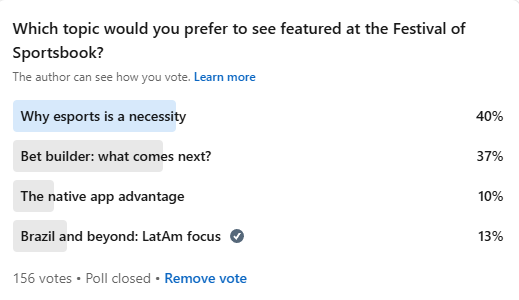But Can You Do It?
Contrasting the CFTC's resource constraints and regulatory challenges in overseeing sports contracts compared to state gaming authorities' expertise.
Does the CFTC's cancelled prediction markets roundtable reveal its resource constraints and regulatory challenges? Meanwhile, state gaming boards and sports leagues question its capacity to oversee sports betting effectively.
The Bulletin Board
THE LEDE: Is the CFTC capable of overseeing sports contracts?
BEYOND the HEADLINE: More Kalshi news.
ROUNDUP: Texas lottery courier update; Rhode Island online gambling age bill; Reads of the Week.
NEWS: Kambi’s Festival of Sportsbook returns.
VIEWS: Massachusetts is diverting casino funds away from local communities.
AROUND the WATERCOOLER: AML shortcomings north of the border.
STRAY THOUGHTS: Healthy and unhealthy competition.
Sponsor’s Message: Increase Operator Margins with EDGE Boost Today!
EDGE Boost is the first dedicated bank account for bettors.
Increase Cash Access: On/Offline with $250k/day debit limits
No Integration or Costs: Compatible today with all operators via VISA debit rails
Incremental Non-Gaming Revenue: Up to 1% operator rebate on transactions
Lower Costs: Increase debit throughput to reduce costs against ACH/Wallets
Eliminate Chargebacks and Disputes
Eliminate Debit Declines
Built-in Responsible Gaming tools
To learn more, contact Matthew Cullen, Chief Strategy Officer, Matthew@edgemarkets.io
The Lede: Is the CFTC Opening a Can of Worms?
Dozens of letters have been submitted to the Commodity Futures Trading Commission (CFTC) for its now-cancelled roundtable on prediction markets. Still, one comment that really stuck out came from the Pennsylvania Gaming Control Board:
“With all due respect to this body, it would take years for the CFTC to create the regulatory system and oversight that state gaming authorities have in place, and, were you to do that, it would create a redundancy to something that already exists and works exceptionally well.”
And therein lies the rub — Which Andrew Kim and I discussed here when he came on the Straight to the Point Talking Shop Podcast.
The challenges of regulating sports betting might also explain (at least in part) why the CFTC cancelled its roundtable and has been virtually silent on the matter. As Kalshi has noted, the CFTC hasn’t asked them to stop offering the markets. At the same time, it hasn’t expressly authorized them.
I did a little research on this and here’s what I discovered.
The Commodity Futures Trading Commission (CFTC) had a total workforce of 699 employees in 2010; newer data is less precise, estimating the CFTC's workforce to be between 250 and 1,000. The CFTC’s 2025 budget request was $399 million and 725 full-time employees. That’s to oversee everything, not just prediction markets.
I asked AI to estimate the total number of regulators and support staff needed to oversee sports betting across the country:
Low-end: 1,000 staff, assuming smaller agencies and minimal tribal/federal involvement.
Mid-range: 1,400–1,600 staff, accounting for 1,200 state staff, 150 tribal, and 50–100 federal.
High-end: 2,000 staff, if larger states have bigger teams, and outsourcing is limited.
There is obviously redundancy at the state level, but notice that the low-end estimate exceeds the entire CFTC workforce, which is already overburdened in its oversight of the multitrillion-dollar swaps market (the US swaps market’s notional value is likely $250–350 trillion, compared to sports betting’s $200–300 billion in handle).
No matter how on board the CFTC is with sports contracts, one has to wonder if it’s equipped or has the appetite to handle it. Is hiring hundreds of experts to oversee sports contracts, which at the top-end might account for $100 billion of the $300 trillion in trades you oversee, worth it?
In December 2024, Paul Hastings LLP said, “The large digital assets cases required significant resources, which left fewer resources for the division’s traditional docket… The CFTC will be forced to balance competing priorities—bringing enforcement actions for violations of the CEA in its traditional markets and taking the laboring oar of regulating digital assets—with the reality of very limited resources.”
And that doesn’t even get into the experience these states have with gambling and sports betting.
The CFTC’s growing focus on digital assets is almost certainly causing the same headaches as its earlier challenges in the swaps market, requiring specialized staff and technology. Given the limited number of employees and stagnant budget, there are significant resource constraints, likely requiring additional hires or tools to manage prediction markets and cryptocurrency exchanges, which will require a bigger budget, which the CFTC has been screaming it needs for years.
Beyond the Headline: Powerful Forces Line Up Against Kalshi
Here’s a quick summary of other recent Kalshi news.
Michigan sends letter, but holds off on cease-and-desist [Event Horizon]: In its letter to the CFTC, the Michigan Gaming Control Board argued that sports betting must follow strict licensing and regulatory frameworks to ensure integrity and protect against financial harm and problem gambling, with unlicensed operations constituting a felony under Michigan law. Among the key points in the MGCB letter:
CFTC-regulated sports betting contracts violate Michigan’s Lawful Sports Betting Act, as only licensed casinos or tribes can offer internet sports betting.
Unregulated contracts risk citizens’ data and funds, potentially harm government finances, and undermine responsible gaming by promoting betting as an investment.
NBA joins MLB as concerns mount [Event Horizon]: The NBA is the second professional sports league to submit a letter outlining its concerns about prediction markets. While not opposed to CFTC markets, the NBA worries that the lack of a dedicated CFTC sports-specific division calls into question its ability to protect game integrity (see The Lede above).
The letter reads in part:
“Without oversight and regulation tailored to the specific circumstances of sports wagering, the integrity risks posed by sports prediction markets are more significant and more difficult to manage than those presented by legal, regulated sports gambling.”
“The NBA's support for legalized sports betting has long been underwritten by our view that sports betting is made safer — both for our fans and for our league — it is legal and subject to robust, sports-specific regulation.”
Illinois regulators are in a holding pattern [Comped.com]: In an exclusive from Comped.com, “Communications obtained from the Illinois Gaming Board via a Freedom of Information Act (FOIA) request indicate Illinois has agreed to temporarily hold off enforcement actions against Kalshi… According to the email sent by a Kalshi attorney, Illinois gaming regulators have agreed to preserve the status quo until at least April 30, pending a key status conference scheduled in federal court in Nevada.
The “Be careful what you wish for” entry [The Closing Line]: In a recent newsletter, Dustin Gouker argues that a quick win by Kalshi would look good on paper, but might not be the best outcome for the company. Summarizing Gouker’s post, ‘While Kalshi benefits as a first mover, legal clarity removes the current barriers keeping gambling giants like DraftKings and FanDuel from entering the prediction market space.’
[Kalshi] Quote of the Week: “Thus far, the Trump-era CFTC has spoken loudly through its silence, allowing Kalshi to not only continue with its sports contracts but expand them.” ~ Bill King, Sports Business Journal
Roundup: TX Lottery Courier Update; RI Gambling Age Bill; Reads of the Week
Texas Lottery officially bans courier services [Texas Tribune]: “The Texas Lottery Commission unanimously voted Tuesday to ban lottery courier companies from selling tickets online amid lawmakers’ ongoing criticism of the practice. The vote was an about-face for the agency, whose officials previously claimed the commission could not regulate the services.” STTP has been following this issue closely since Lt. Gov. Dan Patrick made an impromptu visit to Jackpocket’s retail location, which set off an absolute firestorm. More recently, Lotto.com sued the Lottery.
RI Committee passes bill criminalizing underage online gambling [Rhode Island Current]: As first noted last week, Rhode Island took a mulligan on a bill that would make gambling online by anyone under 21 a misdemeanor. The revote resulted in the measure passing the committee. “Without any debate, the committee on Tuesday reconsidered the bill to amend the state’s 2023 iGaming law and advanced it with a 10-5 vote. The legislation sponsored by Rep. Gregory Costantino, a Lincoln Democrat, would impose up to one year in prison and a $1,000 fine if anyone ages 18 to 20 bets or plays in the virtual casino.”
What I’m Reading: A look at some interesting articles from across the web.
Schuetz: I Have Always Been A VIP Host [Casino Reports]: The concept of catering to players is nothing new, but online access has certainly complicated it.
This Is Your Brain On Gambling Education: A Gen-Xer’s Warning [Casino Reports]: NJ task force recommends early gambling ed, but the best laid plans sometimes backfire.
Event Contracts Versus Sportsbooks: Charting the Legal Divide in U.S. Gambling Law [Snell & Wilmer]
Presque Isle Downs & Casino in potential danger of closing — Here’s who it will impact [Your Erie]: How unregulated skill games are impacting Pennsylvania casinos.
SPONSOR’S MESSAGE - Kambi is the industry’s leading independent provider of premium sports betting technology and services. Trusted by dozens of operators worldwide, each benefitting from the power of Kambi’s global network, Kambi has a proven track record of giving partners the decisive competitive edge required to grow and outperform the market.
As the home of premium sports betting solutions, Kambi offers an expansive product portfolio that caters to the evolving needs of operators and players alike. At its core is Kambi's flagship Turnkey Sportsbook, renowned for its scalability, flexibility, and unrivaled track record of delivering world-class betting experiences globally. Complementing this are Kambi’s cutting-edge standalone products: Odds Feed+, Managed Trading, Sportsbook Platform, Bet Builder, Esports, and Front End.
News: Kambi Announces Festival of Sportsbook
Kambi (a newsletter sponsor) has announced the agenda for its fifth Festival of Sportsbook, a virtual event scheduled to take place on June 3-4, 2025.
Below is a preview of the event; you can register (for free) here.
A Look At Day 1
The Festival will open on June 3rd, with an Executive Panel titled “Sports Betting in 2025 and Beyond: An Executive View.” The panel will discuss “the key developments shaping the sports betting landscape, including the growing influence of AI, evolving regulatory landscape, and player trends set to drive the next phase of sports betting.”
Kambi CEO Werner Becher,
LiveScore Group CEO Sam Sadi
Deputy CEO of KTO Group Jeff Tabone.
The second session on Day 1 will focus on AI, titled “AI Trading in Action: More Than Just Potential.” The session “will demonstrate the results of AI so far and what it may deliver in the future.”
Kambi SVP Trading, Simon Noy
Day 1 will conclude with a panel dubbed, “Why scale matters: gaining competitive edge in sports betting.” The session will provide “key insights into why capitalising on vast scale and data is crucial to competing with today's global giants.”
Kambi Chief Commercial Officer, Sarah Robertson
A Look At Day 2
The first session of Day 2 is a panel discussion titled “Solving the Player Engagement Challenge.” The focus will be on acquisition and retention, and “explore where this battle is being won and lost, as well as the tools and techniques operators can harness to get ahead of the competition.”
Kambi Partner Manager, Raebekkah Platt-Clarke
To-be-announced speaker
The second session on Day 2, “Optimizing Risk Management in the Age of AI,” revisits the topic of AI, this time from the view of the risk management department in a changing landscape of bet builders and player props.
Kambi SVP Risk & Compliance, Oliver Lamb
The final session of the Festival was determined via poll, with Kambi running a poll on its LinkedIn page to determine the closing session of the Festival of Sportsbook. Here’s the session that won.
News: MA Cuts Off Community Casino Payments
Sportsbooks aren’t the only entities getting the rug pulled out from under them by states looking to fill budget holes.
When Massachusetts legalized casino gambling in 2011, it established the Community Mitigation Fund, which is intended to receive 6.5% of the revenue from casino gaming. Since 2015, the Massachusetts Gaming Commission has distributed approximately $56.7 million in grant awards through the CMF to support eligible cities and towns. But MA Gov. Maura Healey has zeroed out contributions.
Per WWLP, “Gov. Maura Healey and the Legislature began last year to alter the distribution of gambling revenues to free up about $100 million to support other spending. Among the changes for fiscal 2025 was zeroing out new funding for the CMF… Now, for the second year in a row, the House Ways and Means Committee budget would stop the flow of casino tax revenues to the CMF.”
SPONSOR’S MESSAGE - Underdog: the most innovative company in sports gaming.
At Underdog we use our own tech stack to create the industry’s most popular games, designing products specifically for the American sports fan.
Join us as we build the future of sports gaming.
Visit: https://underdogfantasy.com/careers
Around the Watercooler
Social media conversations, rumors, and gossip.
This is not a good look — and remember that Alberta is basing its online gambling regulatory scheme on Ontario, which could give opponents of legalization some fodder:
Per the article (STTP spoke with some industry experts who were able to confirm the veracity of the claims, which, as of last week, were only reported by the above publication):
“Ontario’s online casinos—which include some of the world’s largest—couldn’t file suspicious transaction reports to Canada’s money-laundering watchdog’s website for an entire year following a major cyberattack in March 2024.
“iGO spokesperson Josh Elliott confirmed this in an emailed statement, adding that online casinos didn’t regain access to the portal until March 2025. That means information about the overwhelming majority of fraud, money laundering or other suspicious activity Ontario online casinos detected during the year-long period following the hack went largely unreported.”
Stray Thoughts
I spent Sunday at a martial arts tournament with several students. I’ve been to a hundred tournaments, but what stood out this time was the difference in how the kids reacted to winning, particularly between the top competitors (we’re talking about kids, by the way) and the more recreational participants.
The top competitors, the ones likely to take first place, seemed to carry a fear of losing into each match. They practice like their life depends on it, and rarely mingle with nonteammates when waiting. Victory brought relief rather than joy, a release from that pre-competition dread that they might not win.
In contrast, the recreational competitors approached their matches with a different mindset. They were nervous before their matches, but like their expectations, their anxiety seemed less intense than that of the high-level competitors. Wins were genuine moments of joy (and sometimes shock). Wins were also measured in different ways, whether beating someone for the first time or simply making it into the medals; they’d move on quickly, often talking or laughing with friends afterward.
This is a generalization, but the top competitors were weighed down by the need to live up to their potential, and their relief at winning suggested they were fighting against their own anxieties as much as their opponents. On the other hand, the recreational kids approached the event with less at stake emotionally. They were there to compete (and want to win), but also to be part of the experience.
Watching them on the mats, I wondered how these mindsets will shape their growth—whether the high achievers will learn to enjoy their victories or hit plateaus and burn out under pressure, and when the recreational kids might start feeling the same weight as their skills increase and some of them become top competitors.








